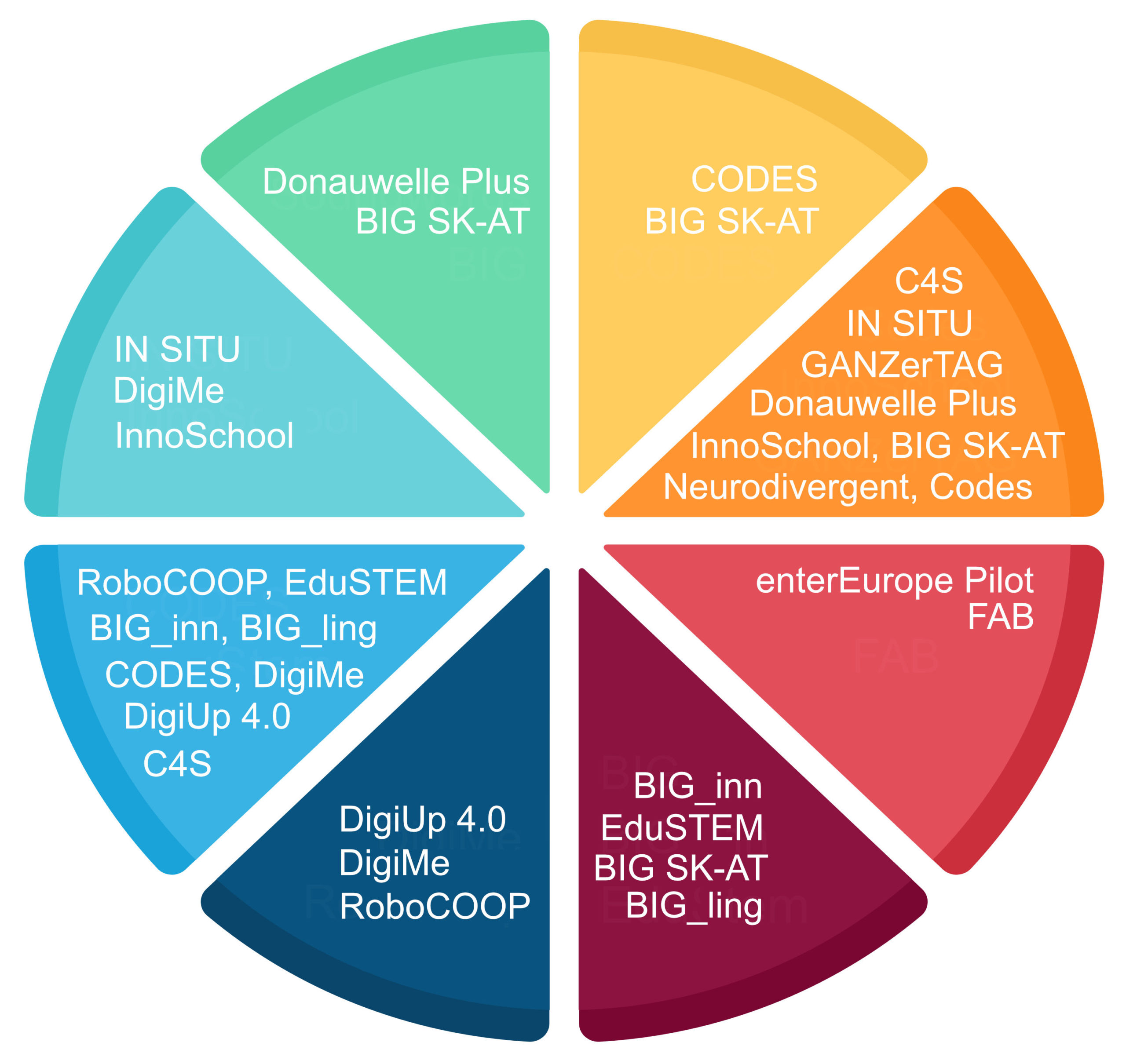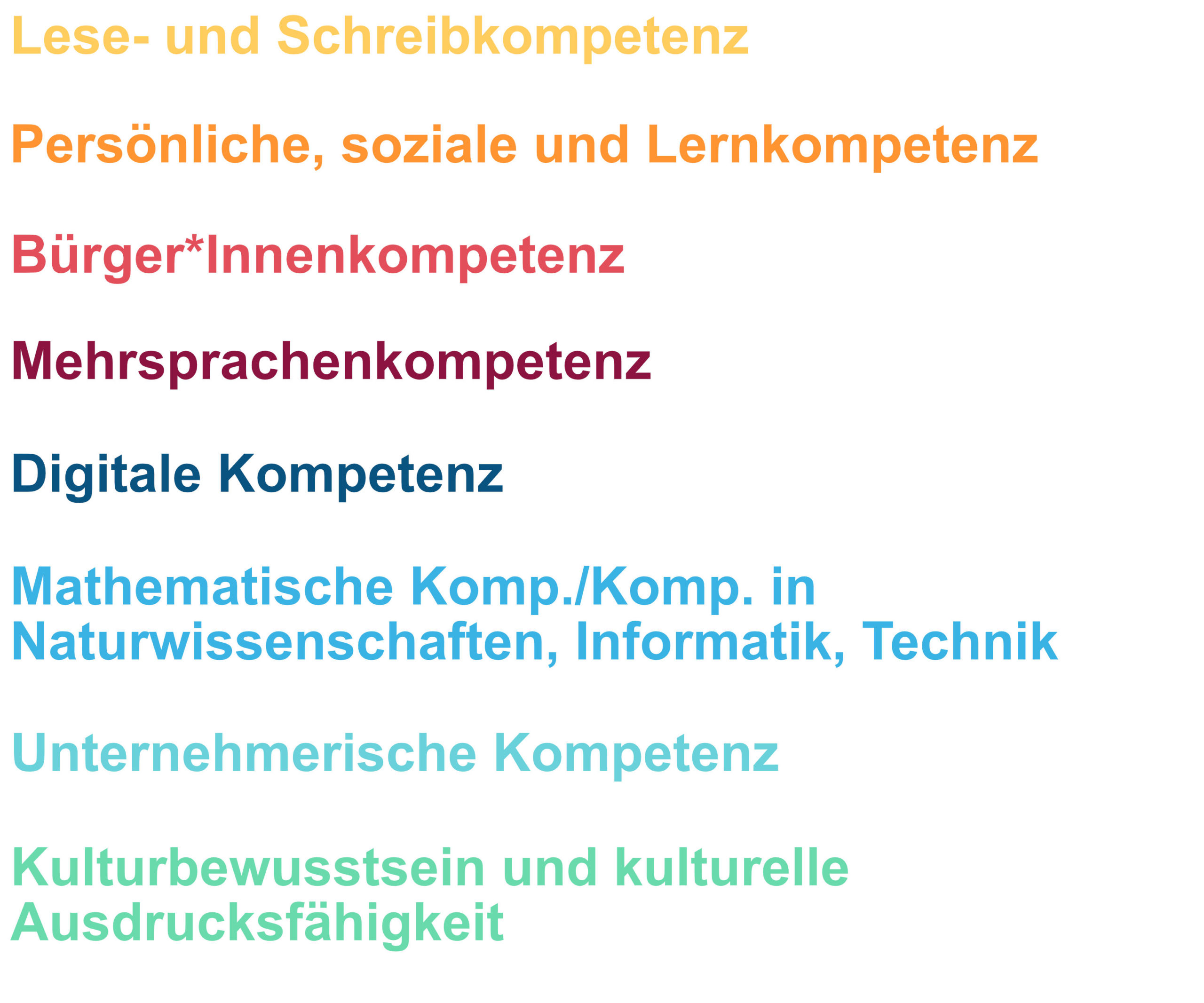The main focus of all projects is the development and strengthening of the eight European key competences for lifelong learning. The competences are a combination of knowledge, skills and attitudes which are adapted to the respective environment. These competences are particularly needed for personal development, for societal integration, for active citizenship and for employability.
Reading and writing skills are the ability to recognize, understand, express, generate and interpret concepts, feelings, facts and opinions, both orally and in writing, using visual, audio and digital materials in various disciplines and contexts. It implies the ability to communicate and relate effectively to other people in an appropriate and creative manner.
The development of reading and writing skills forms the basis for further learning and further linguistic interaction. Depending on the context, reading and writing skills can be developed in the mother tongue, the language of instruction and / or the official language of a country or region.
Personal, social and learning to learn competence is the ability to reflect upon oneself, effectively manage time and information, work with others in a constructive way, remain resilient and manage one’s own learning and career. It includes the ability to cope with uncertainty and complexity, learn to learn, support one’s physical and emotional well-being, to maintain physical and mental health, and to be able to lead a health-conscious, future-oriented life, empathize and manage conflict in an inclusive and supportive context.
Native language competence is the ability to express and interpret concepts, thoughts, feelings, facts and opinions both orally and in writing (listening, speaking, reading and writing) and linguistically appropriate and creative in all social and cultural contexts – general and Professional education, work, home and leisure – to respond to it.
Foreign language competence essentially requires the same skills as mother tongue competence: it is based on the ability to express concepts, thoughts, feelings, facts and opinions both verbally and in writing in an appropriate number of social and cultural contexts – general and professional education, Work, home and free time – to be able to express and interpret according to your own wishes or needs (listening, speaking, reading and writing). Foreign language skills also require skills such as mediation skills and intercultural understanding. The level of command of a foreign language varies within these four dimensions (listening, speaking, reading and writing) and within the different languages, as well as depending on the social and cultural background, the environment and the needs and / or interests of the individual.
Digital competence includes the safe, critical and responsible use of and engagement with digital technologies for education, training, work and participation in society. It extends to information and data literacy, communication and collaboration, media literacy, the creation of digital content (…), security (…), copyright issues, problem solving and critical thinking.
Mathematical competence is the ability to develop and apply mathematical thinking to solve problems in everyday situations. Based on good computational knowledge, the focus is on procedures and activity as well as knowledge. Mathematical competence is connected to different degrees with the ability and willingness to use mathematical thinking (logical and spatial thinking) and representations (formulas, models, constructions, curves, tables).
Science competence is the ability and willingness to explain the natural world in terms of existing knowledge and methodologies, as well as to ask questions and draw evidence-based conclusions. Technical competence is the application of this knowledge and methods to find answers to identified human needs and desires. Scientific and technical competence is connected with the understanding of the change that has been triggered by human activity and includes the active response of the individual as citizen.
Personal initiative and entrepreneurial competence is the ability of the individual to put ideas into practice. This requires creativity, innovation and willingness to take risks, as well as the ability to plan and carry out projects in order to achieve certain goals. Entrepreneurial competence not only helps individuals to consciously perceive their working environment and to seize opportunities in their daily life at home or in society, but also at work; it is the basis for the special skills and knowledge required by those who create or contribute to a social or commercial activity. This should include an awareness of ethical values and the promotion of responsible corporate governance.
Recognizing the importance of the artistic expression of ideas, experiences and feelings through various media such as music, performing arts, literature and the visual arts.




